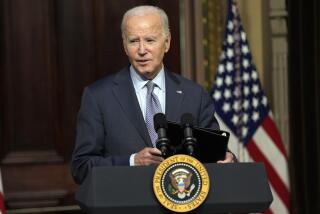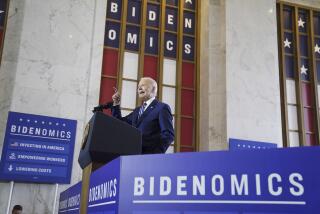Philippines on Road to Recovery
- Share via
MANILA — The Philippines’ shattered economy, which went into a swift decline after the murder of opposition leader Benigno Aquino two years ago, is finally on the difficult road to recovery, economists and businessmen say.
Curbed by the International Monetary Fund, trapped by a heavy burden of international debt and choked by high interest rates, the recovery is expected to be slow and painful. But it is still better than the nightmare of the past two years, say the experts.
Aquino, longtime political rival of President Ferdinand Marcos, was shot to death at the Manila airport two years ago Wednesday, moments after returning from voluntary exile. In the welter of angry street protests that followed, investors shied away from the country, there was a massive flight of capital, the peso was on a free fall against the dollar, inflation last year averaged 50% and more than 90,000 people lost their jobs.
But now inflation and interest rates are falling. Inflation in July averaged 18.7%, and interest rates dropped to 23.6% from a peak of 37.5% last November.
The central bank again looked healthy with international reserves at $1.1 billion in July against a record low of $483 million in October, 1983.
Economist Bernardo Villegas, senior vice president of the independent Center for Research and Communications, says, however, that the Philippine economy is still “sticking out like a sore thumb” in the fast-growing Asia-Pacific region.
No Growth Forecast for 1985
Villegas, whose economic forecasts have often angered the government, said the economic policies of Marcos’ government were generally in the right direction. But he said the recovery would be slow and the dream of returning to an overall economic growth rate of 6%, achieved during the 1970s, may not be reached in this decade. Marcos has predicted a growth rate of 1% this year and 3% for 1986, but the National Economic Development Authority has revised the 1985 estimate to no growth.
In a state of the nation address in July, Marcos, noting the government’s achievement, said: “But we have only passed the first stage in the arduous road to recovery.” He added: “Against every forecast of collapse by some, we have turned the odds in our favor and set a course toward recovery.”
“There is a crisis of confidence,” security broker Ramon Gonzalez said. “The economy needs more investments and not more loans. We have loans coming out of our ears.”
Stock turnover has dropped from nearly 100 million pesos (then equivalent to $10 million) a day before Aquino’s murder to about 1 million pesos (now worth $50,000) a day.
On the positive side, the government has much to report.
It has successfully concluded a standby credit agreement with the IMF. It has reached an agreement with its 483 creditor banks who have put together a $10-billion rescue package that includes $5.8 billion in rescheduling of the country’s $25-billion foreign debt.
A moratorium on repayment of the debt, imposed in October, 1983, is still in force but is expected to be lifted when rescheduling agreements with the individual banks are signed.
Worsening Labor Situation
On the negative side are reduced imports and exports, a worsening labor scene and political uncertainty.
In the first five months of the year, exports dropped 17% to $1.91 billion, though imports also fell 17% to $2.1 billion.
Strikes increased by 76% in the first half of the year to 240, and man-hours lost more than doubled to 12.3 million from 5.66 million in the same period last year.
In the first quarter of 1985, the gross domestic product (GDP) registered a 3.7% decline. Last year, the economy contracted by 5.5%.
Villegas, the economist, has predicted that GDP will decline this year by 3% to 5% and at least 1% next year.
He said political uncertainty was a major problem. “I don’t see confidence being regained (by investors) as long as Marcos is the president.”
Marcos, who has ruled for 20 years, has said he will seek reelection for a further six-year term.
Felix Maramba, president of the Philippine Chamber of Commerce and Industries, said: “The economic debacle that started last year had a telling effect on our way of life.”
He said the situation had become so bad that many companies were simply ignoring wage orders because they could not afford to pay their employees, and this resulted in strikes.
The view is shared by many businessmen. The business community is almost totally alienated from the government.
Villegas said the economic slide had begun before Aquino was killed. But creditor banks would have been quick to restructure the debt and lend a helping hand had Aquino not been assassinated, he said.
More to Read
Sign up for Essential California
The most important California stories and recommendations in your inbox every morning.
You may occasionally receive promotional content from the Los Angeles Times.













